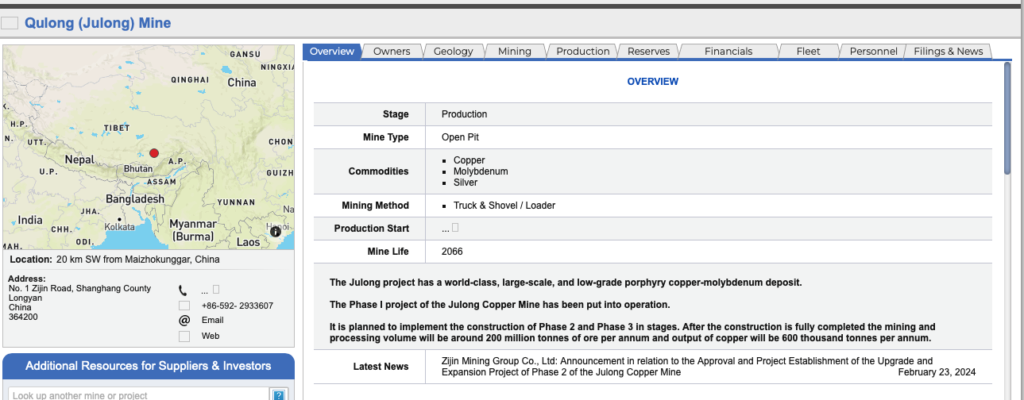Amid Crackdown on Derge Dam Protest, China’s Leading Mining Company Gets Go-Ahead for Copper Mining Expansion in Tibet
By Tsering Choephel

DHARAMSALA, 28 Feb: Amid China’s brutal crackdown on peaceful protesters in Derge, Tibet, mass arrests of Tibetans who staged peaceful protests against China’s hydroelectric dam project on the Drichu River, and the impending forced relocation, Beijing has now reportedly granted approval to Zijin Mining, a leading Chinese mining company, to proceed with its planned second-phase expansion of the Julong copper project. The mining site is located at the eastern lower mountain near the sacred Mount Kailash.
The company declared on its official webpage, zijinmining.com, that upon completion of the project, its operational capacity will increase from 200,000 metric tons per day to 350,000 metric tons, making the Julong mine the largest copper mining operation in China, in terms of both mining and processing scale.
“After the Julong Phase 2 Project is completed and reaches the designated production capacity, the annual ore mining and processing volume of the Julong Copper Mine is expected to exceed 100 million tonnes, making it the largest in China in terms of mining and processing scale and the largest standalone copper mine to be put into operation in the world since the 21st century.”
The Tibet Julong Copper Co., Ltd. company disclosed its commitment to invest a staggering sum of 17.46 billion yuan, equivalent to approximately $2.42 billion, to establish the set goals. It is set to become operational in 2025 with a service life of 36 years.

Though the company projects its mining operations in occupied Tibet as deserving of applause, saying it would promote “the transformation of Tibet’s resource advantages into economic development advantages, and driving the economic and social development of Tibet,” it completely avoids discussing the threat it poses to the Tibetan plateau’s fragile ecosystem. The region around Kailash has been detected to hold permafrost, an important hydrological reserve in arid and semi-arid regions. The mining explorations undoubtedly also disrupt the biodiversity of the area.
In May last year, Zijin Mining had to cease its production for some time due to an accident that left six people working for a subcontractor missing. The missing people were later simply written off as ‘fatalities’ without details provided, as per another report.
The same company is also a major mining player in several other countries, notably in Latin America, with controversial track records. A report by Dialogo Americas on 28 September last year exposed Zijin Mining for labor exploitations, environmental damage, and safety deficiencies. The report says that in November 2022, the Chinese firm’s lithium pilot plant in Argentina was closed by the mining police of Catamarca, due to anomalies with chemical residues.
Even within China proper, the company acts no better. In 2018, the company’s copper mine in Zujin province reportedly polluted the Tingjian River with toxic waste, generating an environmental disaster with a profound impact on local communities, investigative journalism platform Dialogo Chino reported.
With such tainted records, with disregard for the local environment as well as people abroad and within China, the company, which is closely under the Chinese Communist Party’s rein, is expectedly exploiting Tibet’s Plateau recklessly, as it has been doing since the occupation of Tibet over six decades ago.






